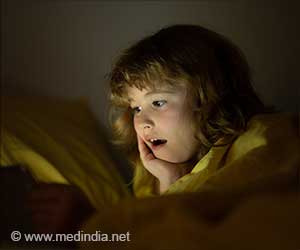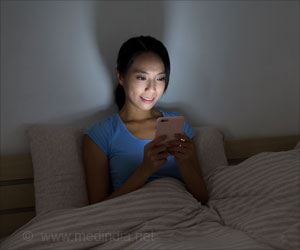Screen use before bed increases the risk of insomnia and reduces sleep time, regardless of the type of screen activity.
- Screen use in bed increases insomnia risk by 59% and shortens sleep duration by 24 miutes
- Social media was not more disruptive than other screen activities
- Reducing screen time in bed can improve sleep quality
How and when screens are used: comparing different screen activities and sleep in Norwegian university students
Go to source). Dr. Gunnhild Johnsen Hjetland, the study’s lead author, explained that the key issue is not what kind of screen activity one engages in, but how much time is spent on screens in bed. She emphasized that screen time likely displaces sleep, as it delays bedtime and reduces the time available for rest.
In the evening, use technology mindfully. Swap interactive devices (video games, web surfing, and messaging) for passive ones (such as music listening, reading an e-book). #medindia #sleep #technology’
The Four Ways Screens Affect Sleep
Sleep is essential for both mental and physical health, yet many people struggle to get enough. Screen use before bed is becoming increasingly common, and it is believed to affect sleep in multiple ways. Screens can disturb sleep through notifications, replace time that should be spent resting, make it harder to fall asleep, and disrupt circadian rhythms due to light exposure. These factors collectively contribute to the growing sleep problems among young adults, especially students.Dr. Hjetland pointed out that previous research on sleep has largely focused on adolescents, but this study specifically targeted young adults. The team explored whether social media might disrupt sleep more due to its interactive and emotionally stimulating nature.
Investigating Screen Habits and Sleep Patterns
The study was based on the 2022 Students' Health and Wellbeing survey, which involved a large sample of Norwegian students. The participants, aged 18 to 28, were asked about their screen habits before bed, including how long they spent on various activities such as watching shows, gaming, using social media, and reading. They also reported their sleep patterns, including how long it took them to fall asleep, how often they experienced sleep disturbances, and whether they felt sleepy during the day.The study categorized participants into three groups: those who only used social media, those who didn’t mention social media, and those who engaged in multiple screen activities, including social media. Researchers also examined the frequency and duration of insomnia symptoms among the participants.
Screen Use Displaces Sleep, Not Wakefulness
The results showed that an additional hour of screen time in bed increased insomnia symptoms by 59% and decreased sleep duration by 24 minutes. However, there was no evidence that social media use was more disruptive than other activities like gaming or watching TV. This suggests that the issue isn’t the type of activity, but the amount of time spent on screens, which displaces time that would otherwise be spent resting.To improve sleep, Dr. Hjetland recommended reducing screen use in bed and, if possible, stopping 30 to 60 minutes before bedtime. Additionally, disabling notifications can help minimize nighttime disruptions.
While the study provides valuable insights, there are limitations to consider. It focused on a single culture, and the impact of screen time on sleep could vary in different parts of the world. The study also grouped different screen activities, like gaming and listening to music, into a single category, which may have different effects on sleep. Furthermore, the study could not establish causality, meaning it’s unclear whether screen use causes insomnia or if those with insomnia are more likely to use screens before bed.
5 Effective Health Tips to Tackle Insomnia
- Set a Consistent Sleep Schedule – Go to bed and wake up at the same time every day.
- Reduce Screen Time Before Bed – Avoid screens 30-60 minutes before sleep to limit blue light exposure.
- Create a Relaxing Bedtime Routine – Engage in calming activities like reading or meditation.
- Watch Your Diet – Avoid caffeine, alcohol, and heavy meals before bedtime.
- Optimize Your Sleep Environment – Keep your bedroom dark, quiet, and at a comfortable temperature.
Reference:
- How and when screens are used: comparing different screen activities and sleep in Norwegian university students - (https://www.frontiersin.org/journals/psychiatry/articles/10.3389/fpsyt.2025.1548273/full)
Source-Medindia













